Make Your Experiences Count. They Can Change the World.
LET’S BRING ALL OF OUR KNOWLEDGE AND EXPERIENCES TOGETHER.
TOGETHER WE KNOW MORE. TOGETHER WE ACHIEVE MORE. TOGETHER WE DO BETTER.
LET’S BRING ALL OF OUR KNOWLEDGE AND EXPERIENCES TOGETHER.
TOGETHER WE KNOW MORE. TOGETHER WE ACHIEVE MORE. TOGETHER WE DO BETTER.
Published: September 29, 2020
Since the beginning of the year, in the scope of our consortium project funded by the Austrian Development Agency (ADA) we have created a print and digital version of our “POLICY DIALOGUE” manual ready for partners to read, use, share, apply, learn with etc. The manual was produced within the consortium project involving HORIZONT3000 (lead), GROOTS Kenya and DESECE, CARE Austria, CARE Uganda and WORUDET, SOS Children’s Villages Austria, Tanzania and Uganda, CARITAS Austria and MIONET, the Austrian, the Kenyan and the Rwandan Red Cross Societies.
But what is this manual all about and why was it developed? We asked the partners of the consortium project to give us some insights on this initiative and its potential use for others:
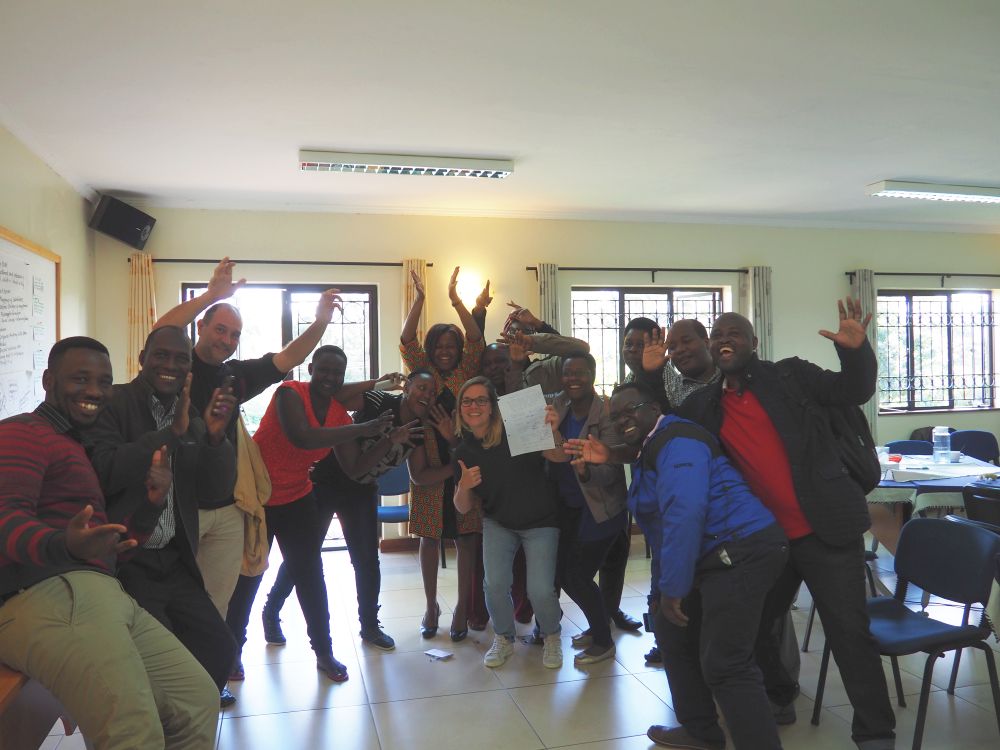
Why and to what end did the consortium partners decide to produce a manual?
“Capacity building in policy dialogue for the consortium members facilitated under the lead of HORIZONT3000 began in 2014. With support from seasoned policy engagement consultants, the consortium members agreed on key steps for engaging in policy dialogue: from agenda setting to policy review with different capacities needed. For the first three years, the members were taken through in-depth capacity building sessions, which included field visits, experience sharing and plenaries. These increased the capacities of the organizations in policy dialogue. The manual was hence developed to document partners’ knowledge and skills for policy dialogue continuity at organizational level, while also to ensure that key aspects like gender mainstreaming are not left out. Additionally, we believed that the manual would be helpful for other likeminded CSOs engaging in policy dialogue.” Jael Amati, Programme Manager, GROOTS Kenya
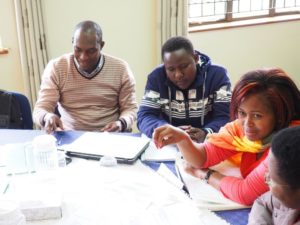

“DESECE organization has been a member of the partner organizations in East Africa implementing the policy dialogue project right from the pilot phase and has participated in all the capacity building trainings organized by the Austrian consortium partners in East Africa. Members were trained on different tools and ways of engaging in policy dialogue, while also developing guidelines for CSOs and recommendations on policy dialogue engagement. The consortium partners decided to produce the manual in order to help consolidate all the knowledge generated and experiences made by partners when implementing policy dialogue initiatives and to support other CSOs in East Africa in their engagement in policy dialogue. Furthermore it is supposed to serve as an introduction to or a refresher on policy dialogue related concepts, tools, and good practices as well as a reference material during group training in target areas.” Emmanual Kizito, Programme Officer, DESECE Organization
How was the process of its elaboration? What was important in the process and why?
“The Manual was created by a task force mandated by the East African consortium members. The task force generated a draft with the support of local policy dialogue consultants. It was widely shared with East African and Austrian consortium members and finished with the support from HORIZONT3000 as a coordinating agency. Finally, it was presented and validated by the Policy Dialogue Consortium Members in Nairobi in November 2019.
Its content was built upon relevant products, tools and methodologies that the task force identified by doing desk reviews and using learning materials/resources from the project’s capacity building initiatives. It also involves topics such as the policy cycle, policy dialogue principles, and policy dialogue guidelines among many others. The process was successful and important as East African partners were able to revisit all their learnings from the first project kick-off in 2014 through all the subsequent capacity building forums up to 2019. The content drawn from capacity building resource materials was supported by the experiences gathered through the execution of the policy dialogue Small Action Fund Initiatives realized in the project. It was like a revision for us and also fun putting all the learnings and practices onto paper.
When the manual was finally presented to the larger East African consortium members, it was like a summary of the entire project approach. They too validated the manual as a true representation of the approaches, principles and methodologies learnt through capacity building in the project and also through experience in the field gained by the implementation of their own policy dialogue initiatives.” Mamo Abudo, Project Manager PACIDA
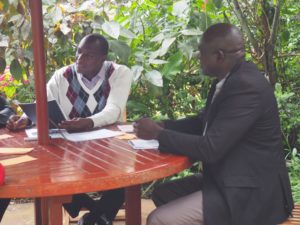
Who is the target group of the manual? Who is it meant to support?
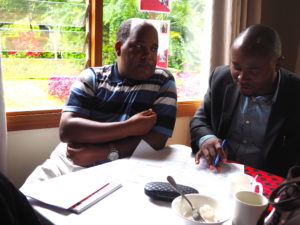
“The primary target group of the manual are members of the consortium policy dialogue project in East Africa and likeminded organizations to enable them to carry out effective evidence based policy change influence. The secondary target group are the beneficiaries, both direct and indirect, who are affected by the policies, which the consortium partners as well as other organizations for policy change and/or implementation advocate for.
The manual is therefore meant to support NGOs at various levels responsible and accountable for influencing policies towards a sustainable social-economic development within East Africa and beyond, including Community and Faith Based Organizations, national networks and forums, farmers and pastoralists groups, children and youth alliances, formal and informal groups of women, as well as associations of journalists and press clubs interested in policy change and policy implementation.” John Batista, National Child Protection Manager, SOS Children’s Villages Tanzania
“As the manual is based on the experiences and learning insights from within the consortium project, it really focuses on contents that partner organizations assessed to be useful for their policy dialogue engagements. It is therefore not a theoretical document, but a practice-oriented one: a handy reference for any organization interested in strengthening their capacities in this field, as well as for staff members, who want to introduce new (or old) colleagues to the approaches, tools and methods. Additionally it is complemented with examples from the East Africa Region in order to put contents in a specific and illustrative context.” Kristina Kroyer, Project Coordinator Policy Dialogue, HORIZONT3000
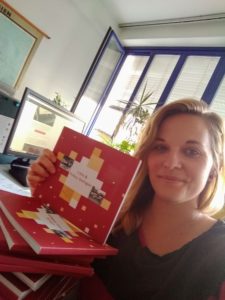
How are partners within the project going to use the manual? What for?
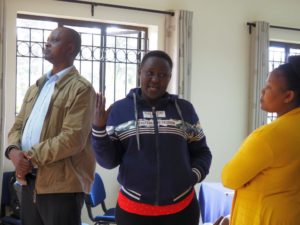
“The partners will use the manual as a reference and support material for various activities, like evidence gathering/ research, dialoguing with government authorities, mapping and mitigating risks, monitoring and evaluating their project initiatives and policies, networking and collaboration activities with other stakeholders, etc. The manual will also support the partners in involving the public to participate in decision making on policy concerns. Furthermore it will foster the engagement in relevant government structures to strengthen mutual accountability and harmonize policy actions. Finally, the manual will be an important tool to integrate the policy dialogue approach into different program sectors of the organization for continuity and sustainability.” Damalie Irienge, Gender and Advocacy Officer, SOS Children’s Villages Uganda
“Within CARE Uganda, the Policy Dialogue Manual has been used to train CARE’s and our partners’ staff. The trained team is going to be essential to support the roll-out of policy dialogue in the different groups we work with in Gulu, Arua and Omugo. The current phase of the policy dialogue project is being implemented alongside the WAYREP Programme (ADA funded strategic partnership). Through the policy dialogue project the capacity of WAYREP structures, consisting in women/girls led groups, community based trainers and community advocacy focal persons, will be built. In this process the manual will guide the development of a simplified training presentation that will support trainers to best reach target groups, and also support the training initiatives towards various stakeholders (female political leaders after elections, target Government Institutions duty bearers/policymakers and CSOs).” Jennifer Gaberu, Advocacy Specialist, CARE International Uganda